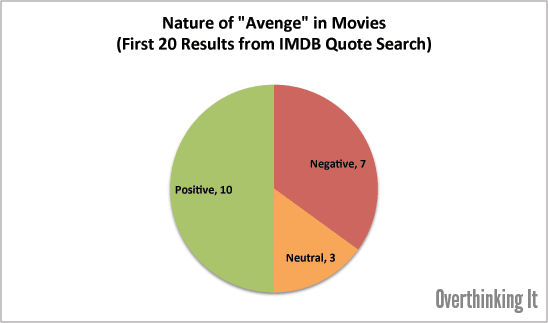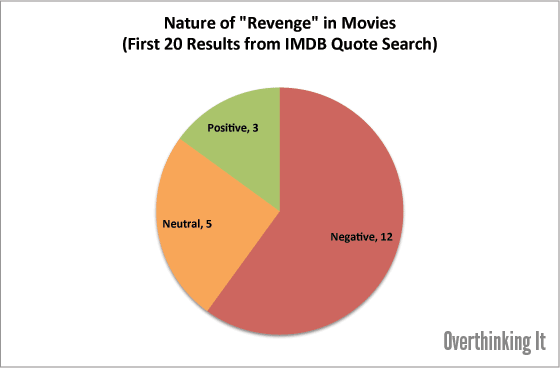With the upcoming release of the super-superhero movie The Avengers, I’ve started to subject the title of the movies/comics to a level of scrutiny it probably doesn’t deserve.

I found “Avengers” to be an odd title for a group of heroes. “Avenge” has a bit of a menacing quality to it, mostly due to its similarity with “vengeance” and “revenge” (more on “revenge” later). These are supposed to be the good guys, right?
First, let’s ground ourselves with a dictionary definition of the verb “avenge”:
- Inflict harm in return for (an injury or wrong done to oneself or another)
- Inflict such harm on behalf of (oneself or someone else previously wronged or harmed)
Inflicting harm on someone is an inescapable part of avenging, and very much what The Avengers will likely do in this movie. After all, it’s not called “The Mediators” or “The Kill-Them-With-Kindness-ers.”
This led me to think about the appearance of “avengers” and “avenging” in other movies, and whether or not they are portrayed in a positive light. To be systematic about it, I did an IMDB Quote Search on the word “avenge,” which returned quotes from movies (and TV shows as well, but we’re putting those aside for now) that include the word revenge. I took the top 20 results and classified them (to the best of my knowledge) as Positive, Negative, or Neutral based on how we, the audience, are meant to relate to the “avenging” being spoken of in the quote.
The results surprised me:

| # | Title | Year | Positive/Neutral/Negative |
| 1 | The Avengers | 2012 | Positive |
| 2 | Iron Man | 2008 | Positive |
| 3 | Star Trek | 2009 | Negative |
| 4 | Twilight | 2008 | Negative |
| 5 | Watchmen | 2009 | Negative |
| 6 | Return of the King | 2003 | Positive |
| 7 | How to Train Your Dragon | 2010 | Negative |
| 8 | 12 Angry Men | 1957 | Negative |
| 9 | The Princess Bride | 1987 | Positive |
| 10 | True Grit | 2010 | Neutral |
| 11 | Magnificent Seven | 1960 | Positive |
| 12 | Body of Lies | 2008 | Negative |
| 13 | Underworld: Evolution | 2006 | Positive |
| 14 | Monty Python and the Holy Grail | 1975 | Neutral |
| 15 | Harry Potter and the Order of the Phoenix | 2007 | Positive |
| 16 | Spider-Man 2 | 2004 | Negative |
| 17 | Red Dawn | 1984 | Positive |
| 18 | The Thin Red Line | 1998 | Neutral |
| 19 | Batman Forever | 1995 | Positive |
| 20 | The Crow | 1994 | Positive |
(Note: I haven’t seen all of these movies, so if my P/N/N classifications are inaccurate, let me know in the comments.)
Of the top 20 quote search results, half of them treated “avenging” in a positive manner. 7 of 20, or 35%, portrayed “avenging” as something negative, and the remaining 15% had a neutral stance on “avenging.”
Based on my gut reaction to the word “avenge,” I was not expecting the proportion of movies that took a positive stance on “avenging” to be so high. So maybe our plucky team of do-gooding superheroes is aptly named, after all.
But remember how I mentioned the word “revenge” earlier? It sounds an awful lot like “avenge,” which is part of the reason why thought “avenge” would have some negative connotation. Its dictionary definitions are also very similar to those of “avenge”:
- Inflict hurt or harm on someone for an injury or wrong done to (someone else)
- Inflict hurt or harm on someone for (an injury or wrong done to oneself or another)
- Inflict hurt or harm on someone for an injury or wrong done to oneself
Despite these similarities, though, my gut reaction to “revenge” is more negative than how I feel towards “avenge.” So I applied the same statistical methodology to movies and their treatment of “revenge” to test this theory out:

| # | Title | Year | Positive/Neutral/Negative |
| 1 | Iron Man 2 | 2010 | Negative |
| 2 | Fight Club | 1999 | Positive |
| 3 | Batman Begins | 2005 | Negative |
| 4 | Memento | 2000 | Negative |
| 5 | City of God | 2003 | Negative |
| 6 | Green Lantern | 2011 | Negative |
| 7 | Goodfellas | 1990 | Negative |
| 8 | V for Vendetta | 2005 | Negative |
| 9 | Mean Girls | 2004 | Negative |
| 10 | Leon: The Professional | 1994 | Neutral |
| 11 | Sin City | 2005 | Neutral |
| 12 | Kill Bill Vol 1 | 2003 | Neutral |
| 13 | Love Actually | 2003 | Negative |
| 14 | Oldboy | 2003 | Negative |
| 15 | The Princess Bride | 1987 | Positive |
| 16 | Star Wars Episode I: The Phantom Menace | 1999 | Negative |
| 17 | X-Men Origins: Wolverine | 2009 | Neutral |
| 18 | Casablanca | 1942 | Positive |
| 19 | Coriolanus | 2011 | Negative |
| 20 | The Pianist | 2002 | Neutral |
(Same caveat with regards to my P/N/N classifications apply. Let me know of any corrections in the comments.)
This did meet my expectations: “revenge” is much more consistently portrayed as a negative thing compared to “avenge.” Granted, the sample size is small, but given the prominence of these movies and the IMDB Quote Search algorithm that purports to return “popular” quotes first, I think we can at least use this as a starting point for the conversation:
- Is there actually a substantive difference in definitions for “avenge” and “revenge”?
- Why is it that “revenge” is portrayed more negatively in movies compared to “avenge”?
- If there were a movie called “The Revengers,” what would it be about?
- In a way, aren’t the communist fighting Wolverines from Red Dawn also “The Avengers”?
Share your answers to these questions, or anything else related to the word “avenge,” in the comments!

I think the difference has to do with the type of wrong and the motivations of the “inflictors”. “Revenge” is for a personal wrong and may or may not be justified, while “avenge” requires some form of ennobling, whether it be a just cause, or something larger than the individual. You get revenge for someone cheating on you; you avenge the death of thousands at the hand of an evil warlord.
Also consider The Avengers sixties tv show and 1998 feature film. What exactly where they avenging? And movie titles like Revenge of the Sith, Revenge of the Nerds, many others. Searching for “avenge” or “revenge” in titles would provide a larger sample.
I assume in this new movie the Avengers are formed in response to some wrong-doing, but I never understood what the comics group was avenging either.
The team is called the Avengers because the Wasp thought they needed a kick-ass sounding team name.
The rest of the team liked the sound of it.
Seriously, that’s all the reason there was.
Also “avenger” has been a word in the English language since the 1500s, and “revenger” isn’t nearly as comfortable a thing.
Here are five words in English that all come from this same Latin root (vindicare, “to punish”) and diverged over the late middle ages and into the 1600s. I’d put them on a continuum from “bad” to “good” as such
vengeance -> revenge -> vindictive -> avenge -> vindicate
Part of this has to do with which root the English is pulling from. “Vindicare” comes from “vim dictus,” which is “to show authority.” So, maybe English words that pull directly from the Latin have a bit more of that sense of authority associated with them. This is reinforced by the fact that words that come into English directly from Latin tend to do so under the context of law, either from the legal profession or through the Scandinavian invasions in the middle ages (since the Vikings and such had robust legal systems).
Whereas Old French pulled “avengier” from “vindicare” which became the Anglo-French “avenger,” which made its way into English after the Normal conquests, its meaning already changed from the Latin. It is possible this shade of meaning had abandoned the Roman idea of rule of law and it picked up more of a medieval idea of justice by personal vendetta and trial by combat and stuff like that. At any rate, the idea of a legal punishment from authority had picked up more of an idea of personal retribution.
And then the easy answer is that in Old French, “re” is an intensive prefix. So, “revengier” means “to _really_ take revenge.” This makes sense then that in English “revenge” is more intensely negative than “avenge,” and that “avenge” is closer on a continuum to the idea of “vindication,” which is much more connected with the idea of taking up proper authority to set things right that have been wrong unjustly.
Source: http://www.etymonline.com/index.php?allowed_in_frame=0&search=avenge&searchmode=none
The Normal conquests were so much more boring than the era of Vikinky invasions a few centuries earlier…
Thomas Middleton wrote “The Revenger’s Tragedy” only a few years after the end of the 1500’s. Or was that Richard Wharfinger?
Doesn’t revenge have a personal connotation while avenge has a altruistic connotation. I don’t know if that’s supported by the definitions or not, but I think “I will avenge you!” rather than “I will get revenge for you!” That sense of standing up for someone else may explain the difference in positive/negative associations.
Yep. Regardless of origin, “revenge” is thought of to be rash and an overcompensation for a perceived wrong. “Avenge” is like the proportionate version of revenge. You avenge someone’s death by killing their killer. You get “revenge” by torturing them first.
Avenge is a verb whose object is some perceived wrongdoing, or the victim thereof. You avenge a murder. Revenge is a noun that you “get… on” some other person. The grammar in avenging emphasizes the inciting act, the grammar in vengeance emphasizes the person you will be hurting to balance the scales.
“I will avenge the murder of my wife!”
“I will get revenge on the man who murdered my wife!”
In either case, you’re saying the same thing, but the differing emphasis colors the statement differently.
wow you clearly are biased. you lost me from the beginning where you made the choice where to put parentheses around parts of the definition just to prove your point. that’s called dishonest journalism, and america is constantly suffering from this. Oh just cover up the part of the definition where it says on behalf of yourself or another, or in response to a threat, because YES avengers inflict harm on people who try to take over the world… from the first paragraph you were altering facts to promote your side of the argument.
Um, not sure if you’re trolling or being serious, but for the record: the definitions are all taken verbatim from what Google gave me, including the parentheses.
Also, although I appreciate your desire for objective, unbiased journalism, I’m afraid you’re not going to find that here. This is a pop culture analysis and criticism site, nothing more, nothing less.
Cheers,
Lee
I’ve never read the Avengers comics, but I have always wondered about the name. As you say, vengeance/revenge presupposes that a wrong has been committed and the avenger is seeking to cause some commensurate level of harm in return, very eye-for-an-eye. Inigo Montoya and the Bride from ‘Kill Bill’ are proper avengers; they know they can’t change the past, they just want to punish someone. Most superhero stories, on the other hand, involve the heroes trying to stop some great harm from happening in the first place.
I think it would be interesting if Samuel L. Fury’s ‘Avenger Initiative’ was more literal: he knows that eventually some catastrophe may take place no matter what we do to prevent it, so he puts a bunch of superheroes on standby in a bunker somewhere. They won’t try to stop anything from happening, but after it’s over they come out and cause a lot of damage in return.
Come to think of it, that sounds a lot like the U.S.-Soviet cold war strategy of mutually assured destruction, if you replace ‘Avengers’ with ICBMs and MRV’d SLBMs, and with the real goal being deterrence. Is that the real original basis of the Avengers in comics, and if so what does that mean for this post-cold war incarnation?
It would end up a pretty boring movie if they’re just hanging out in a bunker training the whole time, and then at the end Fury comes in and is like “Loki decided not to attack because the threat of our reprisal against whoever he’s with was too risky.”
Not to mention that that would be totally out of character for Loki, who is not a rational actor with concrete strategic goals, but, y’know, a chaos god.
But anyway, given that they’re superheroes, I took it that they’re avenging the existence of equally evil forces, so that’s sort of right.